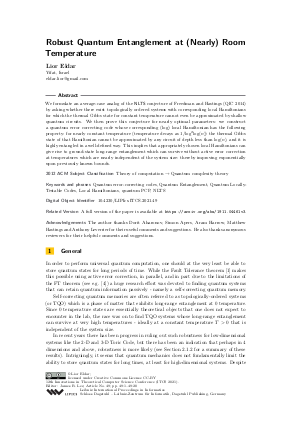Robust Quantum Entanglement at (Nearly) Room Temperature
Author Lior Eldar
-
Part of:
Volume:
12th Innovations in Theoretical Computer Science Conference (ITCS 2021)
Part of: Series: Leibniz International Proceedings in Informatics (LIPIcs)
Part of: Conference: Innovations in Theoretical Computer Science Conference (ITCS) - License:
 Creative Commons Attribution 3.0 Unported license
Creative Commons Attribution 3.0 Unported license
- Publication Date: 2021-02-04
File

PDF
LIPIcs.ITCS.2021.49.pdf
- Filesize: 0.59 MB
- 20 pages
Document Identifiers
Related Versions
-
A full version of the paper is available at https://arxiv.org/abs/1911.04461v3.
Subject Classification
ACM Subject Classification
- Theory of computation → Quantum complexity theory
Keywords
- Quantum error-correcting codes
- Quantum Entanglement
- Quantum Locally-Testable Codes
- Local Hamiltonians
- quantum PCP
- NLTS
Metrics
- Access Statistics
-
Total Accesses (updated on a weekly basis)
0PDF Downloads0Metadata Views
Abstract
We formulate an average-case analog of the NLTS conjecture of Freedman and Hastings (QIC 2014) by asking whether there exist topologically ordered systems with corresponding local Hamiltonians for which the thermal Gibbs state for constant temperature cannot even be approximated by shallow quantum circuits. We then prove this conjecture for nearly optimal parameters: we construct a quantum error correcting code whose corresponding (log) local Hamiltonian has the following property: for nearly constant temperature (temperature decays as 1/log²log(n)) the thermal Gibbs state of that Hamiltonian cannot be approximated by any circuit of depth less than log(n), and it is highly entangled in a well-defined way. This implies that appropriately chosen local Hamiltonians can give rise to ground-state long-range entanglement which can survive without active error correction at temperatures which are nearly independent of the system size: thereby improving exponentially upon previously known bounds.
Cite As Get BibTex
Lior Eldar. Robust Quantum Entanglement at (Nearly) Room Temperature. In 12th Innovations in Theoretical Computer Science Conference (ITCS 2021). Leibniz International Proceedings in Informatics (LIPIcs), Volume 185, pp. 49:1-49:20, Schloss Dagstuhl – Leibniz-Zentrum für Informatik (2021)
https://doi.org/10.4230/LIPIcs.ITCS.2021.49
BibTex
@InProceedings{eldar:LIPIcs.ITCS.2021.49,
author = {Eldar, Lior},
title = {{Robust Quantum Entanglement at (Nearly) Room Temperature}},
booktitle = {12th Innovations in Theoretical Computer Science Conference (ITCS 2021)},
pages = {49:1--49:20},
series = {Leibniz International Proceedings in Informatics (LIPIcs)},
ISBN = {978-3-95977-177-1},
ISSN = {1868-8969},
year = {2021},
volume = {185},
editor = {Lee, James R.},
publisher = {Schloss Dagstuhl -- Leibniz-Zentrum f{\"u}r Informatik},
address = {Dagstuhl, Germany},
URL = {https://drops.dagstuhl.de/entities/document/10.4230/LIPIcs.ITCS.2021.49},
URN = {urn:nbn:de:0030-drops-135886},
doi = {10.4230/LIPIcs.ITCS.2021.49},
annote = {Keywords: Quantum error-correcting codes, Quantum Entanglement, Quantum Locally-Testable Codes, Local Hamiltonians, quantum PCP, NLTS}
}
Author Details
Acknowledgements
The author thanks Dorit Aharonov, Simon Apers, Aram Harrow, Matthew Hastings and Anthony Leverrier for their useful comments and suggestions. He also thanks anonymous reviewers for their helpful comments and suggestions.
References
-
Dorit Aharonov and Michael Ben-Or. Fault-tolerant quantum computation with constant error rate. SIAM J. Comput., 38(4):1207-1282, July 2008.

-
Dorit Aharonov and Lior Eldar. Quantum locally testable codes. SIAM J. Comput., 44:1230-1262, 2015.

-
R. Alicki, Michal Horodecki, P. Horodecki, and R. Horodecki. On thermal stability of topological qubit in kitaev’s 4d model. Open Systems and Information Dynamics, 17, November 2008.

-
Robert Alicki, Michał Horodecki, Paweł Horodecki, and Ryszard Horodecki. Dynamical description of quantum computing: Generic nonlocality of quantum noise. Phys. Rev. A, 65:062101, May 2002.

-
Lior Eldar and Aram Wettroth Harrow. Local hamiltonians whose ground states are hard to approximate. 2017 IEEE 58th Annual Symposium on Foundations of Computer Science (FOCS), pages 427-438, 2015.

-
Omar Fawzi, Antoine Grospellier, and Anthony Leverrier. Efficient decoding of random errors for quantum expander codes. In Proceedings of the 50th Annual ACM SIGACT Symposium on Theory of Computing, STOC 2018, pages 521-534, New York, NY, USA, 2018. ACM.

-
Michael H. Freedman and Matthew B. Hastings. Quantum systems on non-k-hyperfinite complexes: A generalization of classical statistical mechanics on expander graphs. Quantum Info. Comput., 14(1-2):144-180, January 2014.

-
Michael H. Freedman, Alexei Kitaev, Michael J. Larsen, and Zhenghan Wang. Topological quantum computation. Bull. Amer. Math. Soc. (N.S, pages 31-38, 2002.

-
Elizabeth Gibney. Inside microsofts quest for a topological quantum computer. Nature, 2016.

-
Daniel Gottesman. Fault-tolerant quantum computation with constant overhead. Quantum Info. Comput., 14(15-16):13380-1372, November 2014.

-
Matthew B. Hastings. Topological order at nonzero temperature. Phys. Rev. Lett., 107:210501, November 2011.

-
Matthew B. Hastings. Quantum codes from high-dimensional manifolds. In ITCS, 2017.

-
Matthew B. Hastings, Grant H. Watson, and Roger G. Melko. Self-correcting quantum memories beyond the percolation threshold. Phys. Rev. Lett., 112:070501, February 2014.

-
A.Yu. Kitaev. Fault-tolerant quantum computation by anyons. Annals of Physics, 303(1):2-30, 2003.

-
A. Leverrier, J. Tillich, and G. Zémor. Quantum expander codes. In 2015 IEEE 56th Annual Symposium on Foundations of Computer Science, pages 810-824, October 2015.

-
Anthony Leverrier, Vivien Londe, and Gilles Zémor. A construction of quantum (almost) locally testable codes. Quantum Information Processing (QIP), 2019.

-
Shachar Lovett and Emanuele Viola. Bounded-depth circuits cannot sample good codes. In IEEE Conference on Computational Complexity, 2011.

-
M. Sipser and D. A. Spielman. Expander codes. IEEE Transactions on Information Theory, 42(6):1710-1722, November 1996.

- Xiao-Gang Wen. Topological order: From long-range entangled quantum matter to a unified origin of light and electrons. ISRN Condensed Matter Physics, 2013, October 2012. URL: https://doi.org/10.1155/2013/198710.
-
Beni Yoshida. Feasibility of self-correcting quantum memory and thermal stability of topological order. Annals of Physics, 326(10):2566-2633, 2011.

